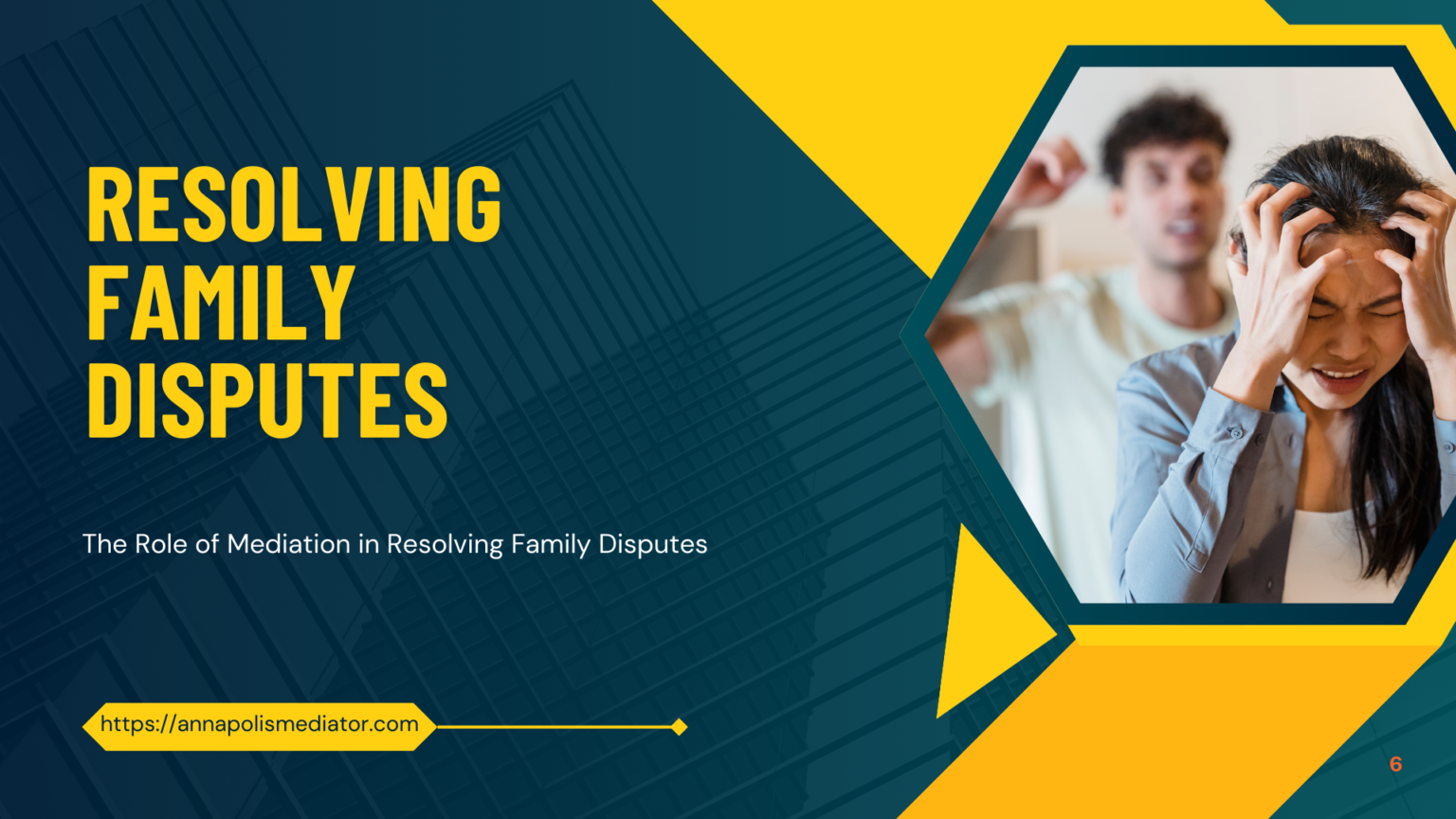The Role of Mediation in Resolving Family Disputes
Family disputes can be among the most emotionally charged and complex conflicts that individuals face. Whether it’s a divorce, child custody issues, or disagreements about inheritance, family disputes can cause significant stress, emotional strain, and long-lasting consequences. In such situations, mediation has emerged as a highly effective alternative to traditional litigation, offering a more peaceful and constructive approach to resolving conflicts. Mediation is an informal, voluntary process where a neutral third party helps the disputing parties reach a mutually acceptable resolution. In family disputes, this neutral third party is typically a trained mediator, such as Susan D. Saunders, a recognized expert in the field of family mediation and parenting coordination.
What is Mediation?
Mediation is a form of alternative dispute resolution (ADR) where a neutral mediator assists two or more parties in resolving their conflict. Unlike a judge or arbitrator, the mediator does not make decisions for the parties. Instead, the mediator facilitates communication, helps identify issues, and explores potential solutions. The goal is to help both parties reach an agreement that they are willing to accept, avoiding the need for costly and often adversarial court proceedings.
In family disputes, mediation offers numerous benefits over traditional court battles, including reduced costs, greater control over the outcome, faster resolutions, and improved relationships post-dispute. It is particularly useful in situations involving child custody, visitation, support issues, divorce, and even family business disputes.
Why Mediation Works in Family Disputes
Mediation has proven to be an effective method for resolving family disputes due to its focus on communication, collaboration, and long-term solutions. Here are some key reasons why mediation is particularly useful in resolving family conflicts:
1. Emotional Support and Healing
Family disputes often involve deep emotional pain and frustration. The mediator helps create a safe and respectful environment for both parties to express their emotions and concerns. This emotional support can be vital in helping individuals process their feelings and work towards a resolution that respects everyone’s needs. The mediator also ensures that communication remains respectful, which is crucial for reducing emotional volatility and promoting healing.
2. Reduced Conflict and Tension
One of the biggest advantages of mediation is that it tends to reduce the level of conflict between the parties. In traditional litigation, family disputes often escalate due to confrontational tactics, leading to resentment and bitterness. Mediation, on the other hand, focuses on collaboration and compromise, which reduces animosity and helps create a more cooperative atmosphere. This is especially important when children are involved, as ongoing conflict can be detrimental to their well-being.
3. Cost-Effectiveness
Litigation can be incredibly expensive, especially in protracted family disputes. Mediation, in contrast, is typically more affordable, as it involves fewer legal fees and a shorter timeline. Mediation allows both parties to save money and avoid the financial drain of lengthy court battles. For families struggling with the emotional and financial burdens of a dispute, mediation offers a more accessible and less expensive path toward resolution.
4. Faster Resolutions
Court cases can take months or even years to resolve, particularly in complicated family disputes. Mediation is much faster, with many cases resolved in a matter of days or weeks. This allows families to move on with their lives sooner and minimizes the stress of prolonged conflict. Additionally, mediation allows the parties to schedule sessions at their convenience, making it easier to accommodate busy lives and work schedules.
5. More Control Over the Outcome
In court, a judge makes the final decision, and both parties must abide by that decision, even if it does not meet their needs or desires. In mediation, the parties have more control over the outcome. They are actively involved in crafting the resolution, which increases the likelihood that both parties will be satisfied with the agreement. This sense of ownership over the outcome can lead to greater compliance and long-term success in implementing the terms of the resolution.
6. Confidentiality
Mediation is a private process, unlike court proceedings, which are typically open to the public. This confidentiality allows participants to discuss their issues freely without fear of judgment or their personal matters becoming public knowledge. This privacy can be particularly important in sensitive family disputes, where the parties may not want their personal information exposed to others.
Mediation in Specific Family Disputes
Divorce and Separation: Mediation is highly effective in divorce and separation cases, especially when both parties are looking for an amicable solution. A mediator helps the couple discuss the division of assets, spousal support, and, most importantly, child custody arrangements. By focusing on the interests of both parties, the mediator can help them craft a divorce settlement that minimizes conflict and promotes cooperation in co-parenting.
Child Custody and Visitation: Mediation is particularly useful when parents are in conflict over custody or visitation arrangements. The mediator works with the parents to develop a parenting plan that reflects the needs of the children and the realities of both parents’ lives. The goal is to create a plan that serves the best interests of the child while also allowing both parents to maintain a meaningful relationship with their children.
Parenting Coordination: When high-conflict parents struggle to implement or follow a parenting plan, a parenting coordinator can step in to mediate and enforce the terms of the agreement. Parenting coordination is especially helpful for parents who have difficulty communicating or resolving disputes on their own. A qualified parenting coordinator, like Susan D. Saunders, can facilitate better communication, resolve conflicts, and ensure that both parents comply with the agreed-upon parenting plan.
Family Business Disputes: In some cases, family disputes extend beyond personal relationships to involve family-owned businesses. Mediation can be a helpful tool for resolving these disputes without damaging the family relationships further. A mediator can help family members address disagreements regarding business management, succession planning, or ownership disputes.
The Role of a Mediator
A mediator, such as Susan D. Saunders, plays an essential role in guiding the mediation process. As a highly trained mediator with expertise in family dynamics, trauma, and addiction, Susan brings a deep understanding of the complexities involved in family disputes. Her training in social work, addiction counseling, and trauma therapy allows her to approach conflicts with sensitivity and insight, ensuring that all parties feel heard and understood.
Susan’s approach is client-centered, focusing on the needs of each individual while facilitating constructive dialogue between all parties. Her compassionate demeanor helps ease the tension in difficult discussions, promoting understanding and empathy. By using evidence-based practices and drawing on her extensive experience, Susan helps families achieve long-lasting solutions that benefit everyone involved, especially the children.
Conclusion
Mediation offers a powerful, effective, and compassionate alternative to traditional litigation in resolving family disputes. Whether it’s a divorce, child custody issue, or family business conflict, mediation can reduce stress, improve communication, and help parties reach mutually satisfactory resolutions. Trained professionals, like Susan D. Saunders, who are skilled in trauma-informed care and family dynamics, can guide families through the mediation process, ensuring that their needs are addressed with understanding and empathy.
If you are facing a high-conflict family dispute and are looking for a way to resolve your issues without the stress and cost of litigation, consider contacting Susan D. Saunders, a highly respected mediator in Maryland. Susan’s unique combination of expertise in mediation, family dynamics, addiction counseling, and trauma treatment can provide the support you need to navigate even the most challenging family disputes.
Schedule a Free Consultation Today!
To learn more about how mediation can help you resolve your family disputes, contact Susan D. Saunders, Mediator, Parenting Coordinator, and Trauma Specialist at 571-839-5301 or via email at AnnapolisMediator@gmail.com. Don’t let conflict take a toll on your family’s well-being—let Susan help guide you toward a peaceful and positive resolution.


